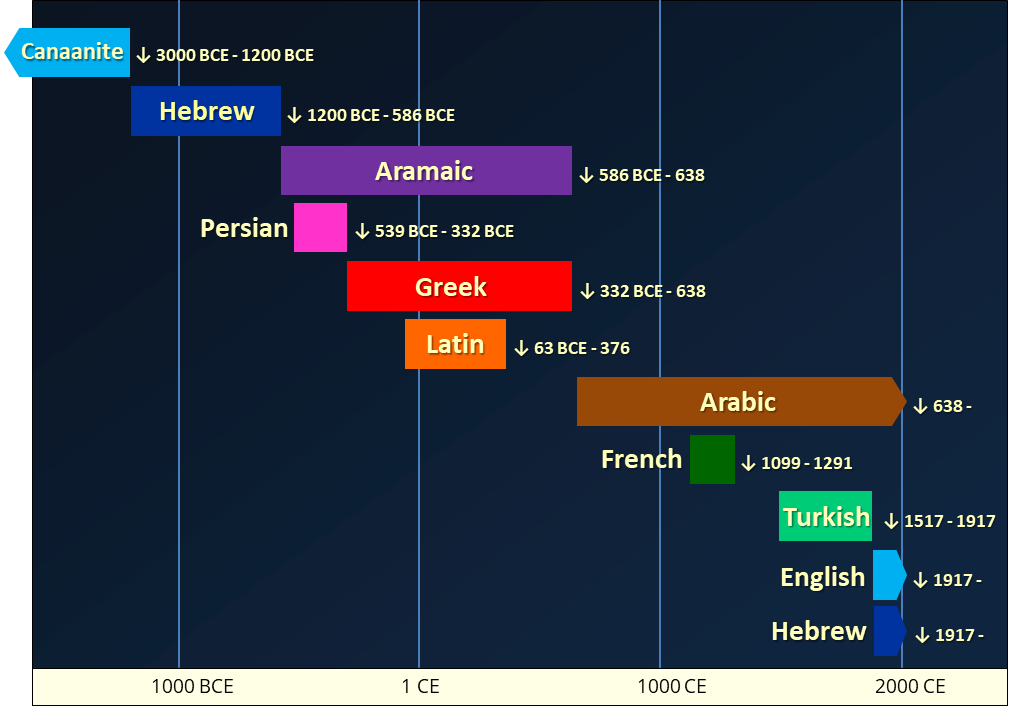
Languages of Israel
See how Israel’s lingua francas and official languages have shifted and varied over the millennia:

Words Borrowed from Canaanite into Hebrew
Originally:
A.nat ענת
A common Hebrew first name
Linked to fertility and hunting, Anat is the goddess of love and war in Canaanite religion.
Ba.al בעל
Master, lord, owner, husband
Baal, the top Canaanite god, is the god of storms, symbolizing strength, power, and virility.
Ba.a.lat בעלת
Owner of, mistress of
Baalat, a fertility goddess, is the female counterpart to Baal in Canaanite religion.
Da.gan דגן
Grain, crop
Dagan is a Canaanite and Mesopotamian god of agriculture and grain.
El אל
God
Chief god of the Canaanite pantheon, El is the creator, benevolent father, and god of the sky.
Ko.hen כהן
Priest, a common Jewish family name
Kohen in Canaanite means priest or a religious official.
Mot מות
Death of, death
Mot, ruler of the underworld in Canaanite religion, is the personification of death.
Sha.khar שחר
Dawn
Shakhar, the Canaanite god of the dawn, is linked to the morning star and the cycle of day and night.
She.mesh שמש
Sun
The word is derived from Sha.mash, the sun god in Canaanite and Ugaritic mythology.
Ya.re.akh ירח
Moon
The word is derived from Ya.rikh, the Canaanite moon god who protects travelers and is associated with cycles of time.
Words Borrowed from Hebrew into Other Languages
Originally:
Be.he.ma בהמה
Beast
In the Torah, behemoth—plural of בהמה—refers to powerful creatures and has come to represent strength and untamed nature in English and Latin.
Ha.le.lu.ya הללויה
Praise the lord
Praise the lord.
Liv.ya.tan לוויתן
Whale
In the Torah, leviathan is a powerful sea creature. In English and Greek, leviathan symbolizes chaos and the untamed forces of nature.
Ra.bi רבי
My teacher
This term became a common title for teachers during the Second Temple period. In English, we use it to refer to a Jewish clergyperson.
Sha.bat שבת
Sabbath
In the Torah’s creation story, God rested on the seventh day, calling it Shabbat. In English and French, the Sabbath is a weekly day of rest.
Yo.vel יובל
50th anniversary
Per ancient Jewish law, every 50th year—the jubilee—land is returned to original owners and debts are forgiven. In English and Spanish, jubilee marks a 50th anniversary celebration.
Words Borrowed from Aramaic into Hebrew
Originally:
Ash.ka.ra אשכרה
Really, truly
Really, truly
Il.ma.le אלמלא
Were it not for
Were it not for
Kos כוס
Cup
Drinking vessel
Par.na.sa פרנסה
Livelihood, income
To provide, sustenance
Ra.vak רווק
Bachelor
Bachelor, single man
Sa.bal סבל
Mover, porter
One who carries or bears burdens
Words Borrowed from Persian into Hebrew
Originally:
Ar.gaz ארגז
Crate, box, case
Crate, box, case
Fis.tuk פיסטוק
Pistachio
Pistachio
Khar.dal חרדל
Mustard
Mustard
Sar.bal סרבל
Overalls
Dress, garment
Words Borrowed from Greek into Hebrew
Originally:
A.si.mon אסימון
Metal token
A silver coin, particularly one that is unmarked or has no specific value stamped on it
Car.tis כרטיס
Card, ticket
Card, tablet
Ret.su.a רצועה
Strap, strip
The word is derived from the Greek word ῥητίνης (rhētínēs) or its related forms.
Ya.kin.ton יקינטון
Hyacinth
Hyacinth
Words Borrowed from Latin into Hebrew
Originally:
Kei.sar קיסר
Caesar, kaiser, emperor; a cantillation symbol
Caesar, emperor
Lig.yon ליגיון
Legion
Derived from the Latin “legio” (meaning military unit), the term refers specifically to a Roman legion.
Si.man סימן
Sign, signal, mark
It’s not certain whether this word comes from “likely has a Greek origin “sema” (sign, mark) or “mark”), or Latin “signum” (sign).
Words Borrowed from Arabic into Hebrew
Originally:
Kha.life ח’ליף
Caliph
In Arabic, a caliph or “khalifah” means successor to an Islamic leader.
Mat.am מטעם
Delicious food
The word is derived from Arabic “maṭ‘am,” which can mean a place for eating but is often associated with food itself in modern Hebrew.
Mis.a.da מסעדה
Restaurant
Restaurant, place of support (relating to hospitality)
Ta.a.rikh תאריך
Date
Date, chronology
Words Borrowed from French into Hebrew
Originally:
Ba.ron ברון
Baron, nobleman
Baron, nobleman
Kaplan קפלן
A common Jewish family name, chaplain
Derived from the French word “chapelain” (chaplain), this name suggests a family heritage linked to rabbinical or scholarly traditions.
Words Borrowed from Turkish into Hebrew
Originally:
Kur.sa כורסה
Armchair, easy chair
Derived from “korsh” (chair)
Man.gal מנגל
Grill, barbecue
Grill, barbecue
Ptil פטיל
Wick
Wick
Sa.pa ספה
Sofa, couch
Sofa, couch
Words Borrowed from English into Hebrew
Originally:
Bee.per ביפר
Beeper
Used in the context of an electronic device used to alert.
Boos.ter בוסטר
Booster
Used in both the contexts of booster seat and booster shot.
Bow.ling באולינג
Bowling
Bowling
Jins ג’ינס
Jeans
Jeans
Kem.ping קמפינג
Camping
Camping